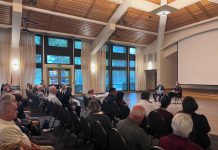On important taxpayer issues, California’s high-tech business
leaders are of two minds. And what they think has an impact on the
rest of the taxpaying public, especially homeowners.
On important taxpayer issues, California’s high-tech business leaders are of two minds. And what they think has an impact on the rest of the taxpaying public, especially homeowners.
Regrettably, two business groups which have declared virtual war on ordinary taxpayers are the Silicon Valley Manufacturing Group (SVMG)and the San Jose Silicon Valley Chamber of Commerce. The latter is headed by Jim Cunneen, a former member of the state Assembly. When Cunneen was in the Legislature, he impressed many – including us – with his energy and earnestness.
While the entrepreneurial spirit reflected by those on the cutting edge of the “dotcom” world is to be applauded, it is difficult to understand why many of these folks continue to push a radical anti-taxpayer agenda. After all, it was Silicon Valley dotcom millionaires and billionaires who funded much of the Proposition 39 campaign in 2000, which resulted in making it much easier to increase property taxes for school bonds.
But we can’t help but notice that these Silicon Valley business leaders are very picky about which tax increases they support. They tend to back only those tax measures whose impact would fall most heavily on others, and to oppose those that would increase levies on themselves and their companies. (Not long ago, Silicon Valley leaders were advocating a higher tax on homeowners here in California on the same day their lobbyist in Washington was advocating for an R&D tax credit for their industry).
We at the Howard Jarvis Taxpayers Association have known Jim Cunneen since he first announced himself as a candidate for the Legislature nearly a decade ago. We endorsed him because, among other reasons, he agreed to support the two-thirds vote. And for most of his legislative career, he recognized the importance of this super-majority vote protection.
As chamber president, Cunneen still understands that a two-thirds vote can effectively prevent unreasonable taxation because he was an outspoken opponent of Proposition 56. This public employee union-backed measure was on the ballot last March and would have undone Proposition 13’s requirement that new state taxes require a two-thirds vote. In a Mercury News opinion piece Cunneeen wrote, “The two-thirds rule is a protection against tax increases run wild, not an obstacle to raising needed revenues.”
However, recent events show that Cunneen has acquiesced to his associates who want to continue the effort to shift more and more of the costs of education onto the backs of homeowners.
The chamber president has joined Taxpayers for School Improvement, a recently formed committee made up of some of the major backers of Proposition 39. The goal of this new group is to do away with the two-thirds vote required to increase property taxes for schools. Using their successful Proposition 39 as a template, they plan to field an initiative that would require only a 55 percent vote to increase property taxes, known as “parcel” taxes. Unlike bonds, the proceeds of which must be directed to capital improvements, the revenue raised from parcel taxes can be used for anything, including salary increases for administrators.
Parcel taxes place an equal tax on all parcels of property. They are particularly odious because the result is that retirees living in a bungalow, the new buyer of a tract home, the multimillionaire president of a high tech company residing in a mansion, and a major business corporation all pay exactly the same flat dollar amount. (We suspect that a $400 per year parcel tax would be a greater financial burden to a retired couple than to Cisco).
Moreover, since in virtually all communities the majority of parcels of property are residential, homeowners pay for most of the tax. And of course, this is another instance where everyone votes, regardless of their obligation to pay the tax. If parcel taxes were to require only a 55 percent vote, we know from the experience of Proposition 39, virtually all would pass, and the result would be tens of billions in new taxes added to the burden of homeowners.
Regardless of what may be Jim Cunneen’s best intentions, he and his Silicon Valley colleagues can’t have it both ways when it comes to the two-thirds vote requirement. They showed a great appreciation for the two-thirds vote when they would have been the likely target of tax increases had Proposition 56 passed. Now, however, they continue their efforts to weaken the two-thirds vote protection at the local level, especially for taxes that hit ordinary taxpayers the hardest.
If they are really so anxious to increase taxes, how about one that falls most heavily on the high tech industry? We are sure homeowners can come up with some ideas.







